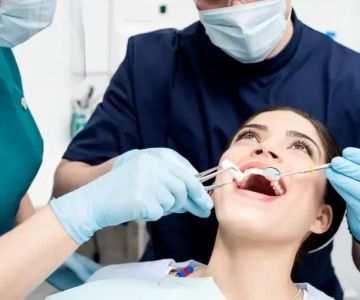Common Tooth Emergencies and Their Handling
Knocked-out Tooth: If your permanent tooth gets knocked out, it's crucial to act quickly. Locate the tooth, and if it's dirty, rinse it gently in water. Try to place the tooth back into the socket or keep it moist in milk or saliva. Seek immediate dental treatment as there's a chance to save the tooth if seen within an hour.
Cracked Tooth: Save and rinse any broken pieces. Rinse your mouth with warm water, apply a cold compress to reduce pain and swelling, and visit your dentist promptly.
Toothache: Rinse your mouth with warm water, use dental floss to remove lodged food, and take over-the-counter pain relievers. See your dentist if the pain persists.
Dental Abscess: Abscesses are serious and require immediate attention. Rinse your mouth with a mild salt-water solution to ease the pain and draw the pus to the surface. See your dentist as soon as possible.
Preventing Dental Emergencies
To prevent dental injuries, take several precautions. Use mouthguards during sports activities, ensure your child is in a seatbelt or car seat, childproof your home to prevent falls, have regular dental visits, and follow good oral hygiene protocols. Avoid chewing on hard objects like ice and popcorn kernels.
When and Where to Seek Help
For most dental emergencies, your dentist's office is the first place to go. But for more severe injuries like broken facial bones, head to the emergency room. If your dentist isn't available during an emergency, don't hesitate to go to a hospital emergency room.
Managing Symptoms Before Seeing the Dentist
If you're experiencing a non-emergency issue like a dull toothache or a small chip in a tooth, there are still steps you can take to manage the symptoms. Rinse your mouth with warm water, floss, and take pain relievers if needed. But always schedule an appointment with your dentist as soon as possible.
Emergency Room Care for Tooth Pain
If tooth pain occurs when your dentist's office is closed, the emergency room can provide medications to alleviate pain and swelling. However, they don't perform restorative treatments, and you'll still need to see your dentist after.
In conclusion, a tooth emergency can be a stressful situation, but being informed and prepared can make the process much smoother. Remember to act quickly, follow the appropriate steps, and seek professional help as soon as possible to ensure the best outcome for your dental health.




 Westgate Dental Arts
Westgate Dental Arts Coventry Family Dental
Coventry Family Dental Familia Dental
Familia Dental Dr. Daniel S. Fife, DDS
Dr. Daniel S. Fife, DDS Dentistry At Suburban Square: Michael I. Wollock, DMD
Dentistry At Suburban Square: Michael I. Wollock, DMD Comfort Care Dental
Comfort Care Dental The Importance of Oral Health Education During Pregnancy for a Healthy Pregnancy
The Importance of Oral Health Education During Pregnancy for a Healthy Pregnancy Why Skipping Dental Checkups Can Lead to Bigger Oral Health Problems
Why Skipping Dental Checkups Can Lead to Bigger Oral Health Problems Advantages of Porcelain Dental Restorations
Advantages of Porcelain Dental Restorations Best Tips for Brushing Your Teeth Properly for Healthy Gums: Essential Techniques for Oral Health
Best Tips for Brushing Your Teeth Properly for Healthy Gums: Essential Techniques for Oral Health How Can Diabetes Cause Tooth and Gum Problems? Preventing and Managing Oral Health Issues
How Can Diabetes Cause Tooth and Gum Problems? Preventing and Managing Oral Health Issues Healthy Habits for Promoting Good Oral Health and Hygiene: Tips for a Healthy Smile
Healthy Habits for Promoting Good Oral Health and Hygiene: Tips for a Healthy Smile